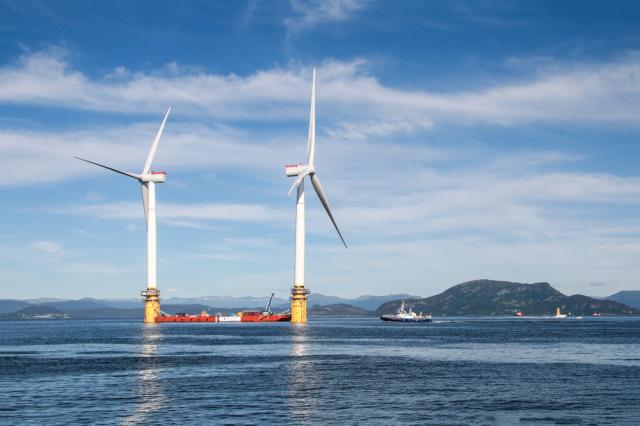
Offshore floating wind turbines in Norway. (Source: Shutterstock)
Norway’s Equinor and Germany’s RWE signed a memorandum of understanding (MOU) Jan. 5 to develop a strategic energy partnership in Europe involving large-scale energy projects and boosted hydrogen production, the two companies announced in separate press releases.
The MOU details multiple decarbonization projects to bolster Europe’s energy transition and to lessen Germany and Norway’s carbon footprint.
As part of Germany’s transition away from coal, Equinor and RWE will jointly construct and own hydrogen-ready power plants run by natural gas. Their goal is to power them solely with hydrogen fuel once large-scale hydrogen production technology becomes available. These plants are based on technology meant to compensate for inconsistent electricity generated from renewables, according to RWE’s press release.
“Through this collaboration we will strengthen the long-term energy security for Europe’s leading industrial country while at the same time offer a viable route to a necessary energy transition for hard to abate industries. The collaboration has the potential to develop Norway into a key supplier of hydrogen to Germany and Europe. This is a unique opportunity to build a hydrogen industry in Norway where hydrogen also can be used as feedstock to domestic industries,” said Anders Opedal, Equinor CEO and president.
Equinor also plans to build facilities in Norway with an initial low-carbon hydrogen capacity of 2 gigawatts (GW) to produce low-carbon hydrogen from natural gas, said RWE.
More than 95% of the CO₂ produced will be captured and permanently stored offshore Norway under the seabed, according to Equinor.
The low-carbon hydrogen, also known as blue hydrogen, will be transported through a pipeline connecting the facilities in Norway to Germany, which RWE has agreed to purchase and use in hydrogen-ready gas plants, said RWE.
The two companies also plan to explore offshore wind energy opportunities in Norway and Germany, as well as other countries adjacent to the pipeline. Renewable, or green, hydrogen produced would eventually replace the pipeline’s low-carbon hydrogen.
“In order to make progress in the conversion from fossil fuels to hydrogen, there is an urgent need for a rapid ramp up of the hydrogen economy,” said RWE CEO Dr. Markus Krebber. “Blue hydrogen in large quantities can make a start, with subsequent conversion into green hydrogen supply. This is exactly what we are driving forward with our partnership – providing the industries with relevant quantities of hydrogen. In addition, our planned investments into hydrogen-ready gas-fired power plant will ensure security of supply in a decarbonized power sector.”
Recommended Reading
Gulfport Energy to Offer $500MM Senior Notes Due 2029
2024-09-03 - Gulfport Energy Corp. also commenced a tender offer to purchase for cash its 8.0% senior notes due 2026.
ONEOK Offers $7B in Notes to Fund EnLink, Medallion Midstream Deals
2024-09-11 - ONEOK intends to use the proceeds to fund its previously announced acquisition of Global Infrastructure Partners’ interest in midstream companies EnLink and Medallion.
Kosmos to Repay Debt with $500MM Senior Notes Offer
2024-09-11 - Kosmos Energy’s offering will be used to fund a portion of its 7.125% senior notes due 2026, 7.750% senior notes due 2027 and 7.500% senior notes due 2028.
Upstream, Midstream Dividends Declared in the Week of July 8, 2024
2024-07-11 - Here is a selection of upstream and midstream dividends declared in the week of July 8.
Solaris Stock Jumps 40% On $200MM Acquisition of Distributed Power Provider
2024-07-11 - With the acquisition of distributed power provider Mobile Energy Rentals, oilfield services player Solaris sees opportunity to grow in industries outside of the oil patch—data centers, in particular.
Comments
Add new comment
This conversation is moderated according to Hart Energy community rules. Please read the rules before joining the discussion. If you’re experiencing any technical problems, please contact our customer care team.





